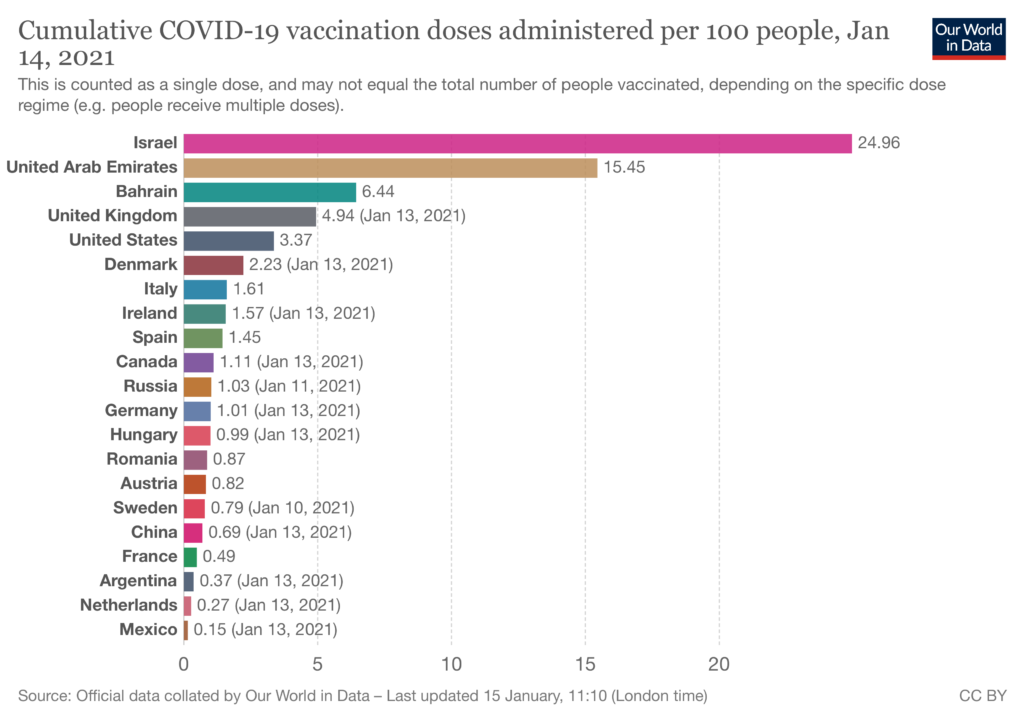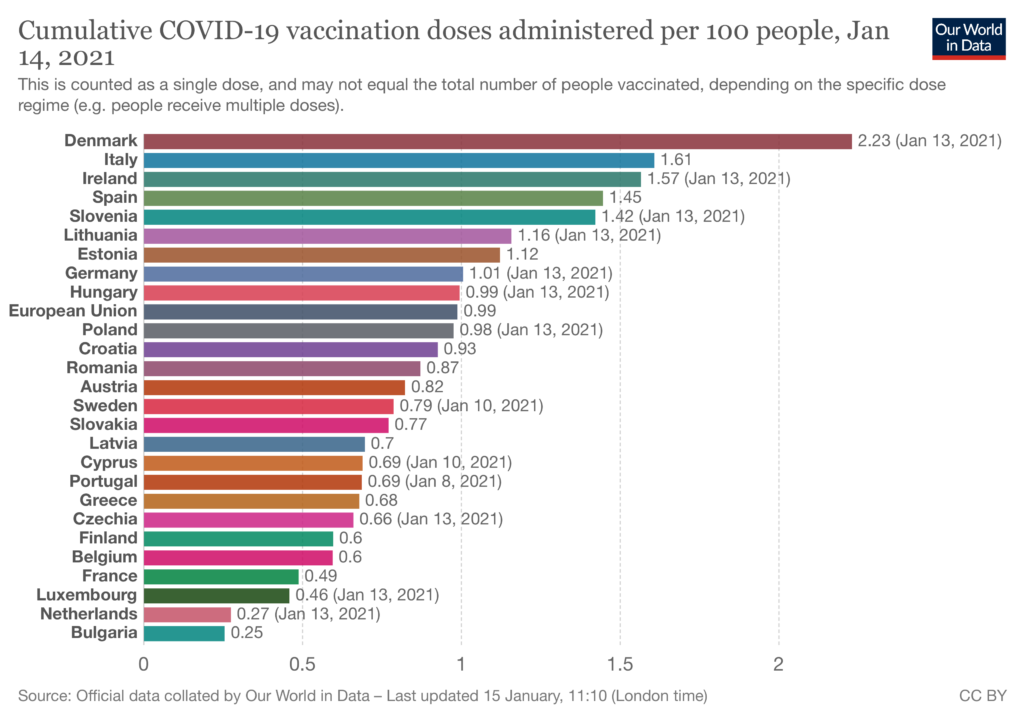President-elect Biden says U.S. vaccination rollout "has been a dismal failure thus far," and he'll lay out a plan Friday to complete 100 million shots in his first 100 days in office
"We will have to move heaven and Earth to get more people vaccinated" https://t.co/YiYVNMBhOS pic.twitter.com/9q23RKEitB
— CBS News (@CBSNews) January 15, 2021
United States President-elect Joe Biden called his country’s COVID-19 vaccine rollout “a dismal failure thus far” in remarks on Thursday, pledging to increase the rate of inoculations once he takes office next week.
The incoming president’s comments came the day after the US Centers for Disease Control and Prevention (CDC) reported that COVID-19 vaccinations are now approaching one million doses per day. The 951,000 daily doses that the CDC reported on Wednesday represent a major increase in a vaccine rollout that has been widely criticized as too slow-moving, uneven, and marred by technical glitches. The previous day, just roughly 340,000 doses were administered.
Even with the sharp increase in daily inoculations, CBS News reported that more than two-thirds of the total doses administered to US states have yet to be administered.
Meanwhile, other countries have shown that the rate of vaccinations can go much faster. In Israel, more than 23 percent of the country’s nine million inhabitants have received the first dose of the vaccine and the second round of inoculations got underway this week, according to local media.
Israel is by far the world leader in per capita vaccination rate and the share of the total population to have received at least one vaccine dose, according to global tallies kept by Our World in Data.

“We will be the first country in the world to emerge from the coronavirus,” Israeli Prime Minister Benjamin Netanyahu, who was the first in the country to receive the vaccine, said in a statement.
Following Israel in the global vaccination race are the Gulf states of the United Arab Emirates and Bahrain, which have delivered the first dose to roughly 13 and 6 percent of their populations, respectively. The United Kingdom, which was the first country in the world to begin administering COVID-19 vaccinations, is next with roughly four percent of its population, while the US follows with just under three percent.
Uneven pace in Europe
Within the European Union, the pace of vaccinations varies widely. Denmark has led the way and has now vaccinated just over two percent of its population. But even there, the pace of vaccinations has been up and down. On Jan. 6, the small Nordic nation administered nearly 20,000 daily vaccines. Six days later, that number was down to just 453 when its initial stockpile of vaccines ran out. Denmark received a third shipment of Pfizer’s vaccine on Monday and by Thursday daily vaccines were back over 17,000.
While other countries have opted to save half of their vaccination supply to ensure that there is enough for all inoculated patients to receive their second dose, Denmark used all of its first deliveries of the Pfizer-BioNTech vaccine to give the first shot to as many people as possible.
“The vaccine should be distributed the very second it touches Danish soil,” Danish Prime Minister Mette Frederiksen said in a mid-December interview with broadcaster TV2.
Frederiksen has said that the country’s goal is ultimately to get to 100,000 vaccinations per day. Denmark has announced that the country will have completed its vaccination routine by June 27 at the latest if all ordered doses are received.
Denmark’s vaccination progress thus far has outpaced larger European countries. In France, just 0.49 percent of the population has been vaccinated. The French government has been criticized for its slow pace, which has been fuelled in part by strong anti-vaccination sentiment. A December Ipsos survey found that just 40 percent of French citizens were willing to be vaccinated against COVID-19, the lowest percentage of the 15 countries included in the survey. Some analysts suggest that France’s status as the most anti-vax country in the world caused the government to take an overly cautious approach to its rollout.
Italy, Ireland, Spain and Germany had all vaccinated between 1 and 1.6 percent of their populations as of Jan. 14. A comparison of EU countries is below.

Other countries lag behind
In raw numbers, China joins the US as the only two countries to vaccinate more than 10 million people. But China’s large population of nearly 1.4 billion means that it has only vaccinated 0.69 percent of its inhabitants.
India has announced plans to vaccinate 300 million people within six months, using the CoviShield vaccine from AstraZenca and Indian-developed vaccine Covaxin that is currently still in late-stage clinical trials. India’s mass vaccination program is scheduled to begin this weekend. The country of 1.4 billion has the second-highest number of COVID cases with 10.5 million, trailing only the United States.
Brazil, which has the third-highest number of cases and the second-highest number of COVID deaths with over 207,000, has not yet announced a formal plan for immunizing its population of 210 million. Brazilian President Jair Bolsonaro has consistently downplayed COVID-19, calling it “a measly cold” and scoffing at lockdowns and social distancing. Bolsonaro has said that he refuses to be vaccinated.
COVID-19 vaccines have yet to reach the African continent. According to a VOA report, one million doses are expected to arrive in South Africa by the end of January. South Africa has been the hardest-hit country on the continent thus far, with roughly 1.3 million cases and over 35,000 deaths.
The African Vaccine Acquisition Task Team, established by the African Union to secure adequate vaccines for the continent, announced on Thursday that it has acquired some 270 million vaccine doses, but these are not expected until April. According to The Economist Intelligence Unit, low-income countries are unlikely to have wide access to a COVID-19 vaccine before 2022/23.
Even with international support, the rollout of a coronavirus vaccine across much of SSA will be slow, and won't be widely available for most of the population until mid-2022 onwards pic.twitter.com/NqHDKyJNzU
— The EIU Africa team (@TheEIU_Africa) December 11, 2020
Main image from Alex Gakos/Shutterstock shows 90-year-old Margaret Keenan, the first person in the world to receive a COVID-19 vaccine.
